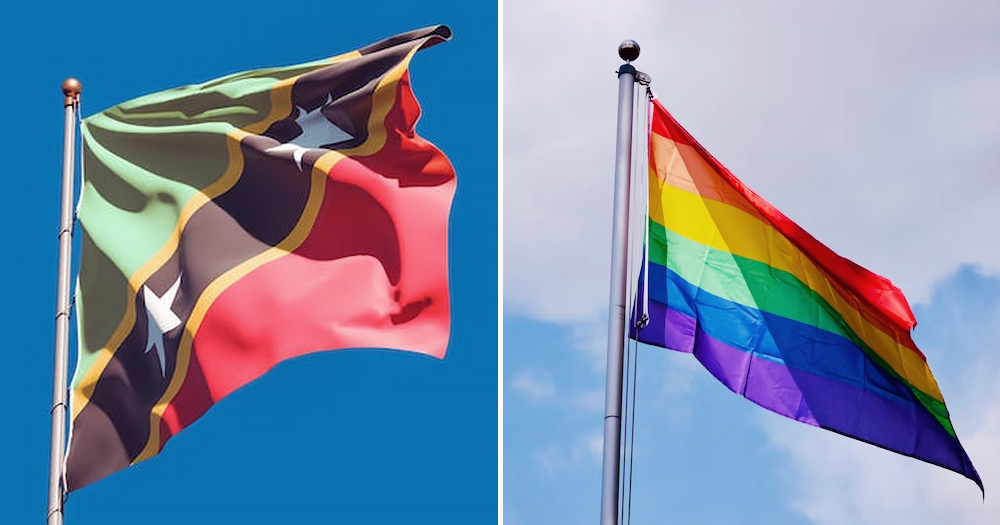On August 29, the top court for nine Caribbean nations overturned a colonial-era ban on same-sex relationships in Saint Kitts and Nevis. The law criminalising same-sex sexual intercourse was a legacy of British colonial rule over the country.
The case started when Jamal Jeffers, a gay man helped by the nonprofit St Kitts and Nevis Alliance, sued the Caribbean country’s attorney general, arguing that the constitutional right to liberty allowed individuals to freely choose their intimate partners and thus the ban on same-sex intercourse was unconstitutional.
In turn, the local government contended that such freedom did not apply to sexual orientation because it would deviate from moral norms and would open “the floodgates to practices that could alter and compromise survival of the culture and personality of the Federation,” which was “established on the belief in Almighty God and the inherent dignity in each individual.”
While rarely invoked, sections 56 and 57 of the Offences Against the Persons Act, which criminalised acts of “buggery” and “unnatural offences”, were amended in 2012 to increase the penalty from four to 10 years and to include the possibility of hard labour.
Tynetta McKoy Executive Director of St Kitts & Nevis Alliance for Equality says the repeal of the anti-LGBTQ+ laws in St Kitts and Nevis establishes that a persons sexuality should never be the basis for discrimination.
.
.
.#litigation #lgbtqrights #equality #changetheworld pic.twitter.com/9aT8yMhhlx— ECADE (@EC_Equality) August 30, 2022
With its ruling, the Eastern Caribbean Supreme Court upheld the motion presented by Jeffers to strike down the two sections which, as written by judge Trevor Ward in the judgement, are “not reasonably justified in a democratic society in circumstances where they proscribe sexual acts between consenting adults in private, which involve no element of public conduct or harm to, or sexual acts, with minors.”
“To the extent that it criminalises the private lives of gay persons in this year, the law is excessive and arbitrary,” added Ward. “Section 56 of the act shall be read as if the words ‘This section shall not apply to consensual sexual acts between adults in private’ were added at the end of the section.”
This “landmark” decision represents an “important step forward in ensuring equality and dignity for the lesbian, gay, bisexual and transgender community in St Kitts and Nevis and the whole Caribbean,” said Luisa Cabal, UNAIDS Regional Director for Latin America and the Caribbean.
Great news from St. Kitts and Nevis!
A judge has just ruled that the law criminalising sex between consenting men is unconstitutional.
Congratulations to all who worked so hard for this win! ????❤️https://t.co/EURyOyrZZB
— UNAIDS (@UNAIDS) August 29, 2022
“Today, St Kitts and Nevis joins a growing list of Caribbean nations that have overturned these colonial-era laws that deny people’s human rights and hold back the response to the HIV pandemic. Everyone benefits from decriminalisation,” she commented.
Indeed, the ruling passed in St Kitts and Nevis follows similar decisions in other Caribbean countries such as Belize, Trinidad and Tobago, and Antigua and Barbuda, that found bans on same-sex relationships unconstitutional. At present, seven other countries in the Caribbean criminalise same-sex intercourse between consenting adults: Barbados, Dominica, Grenada, Guyana, Jamaica, St Lucia, and St Vincent and the Grenadines.
In the words of Kenita Placide, executive director of the Eastern Caribbean Alliance for Diversity and Equality (ECADE): “This is a transformative journey and a step to full recognition of LGBTQ persons across the Organisation of Eastern Caribbean States. An affirmative decision means a yes to privacy and a yes to freedom of expression.”
© 2022 GCN (Gay Community News). All rights reserved.
Support GCN
GCN is a free, vital resource for Ireland’s LGBTQ+ community since 1988.
GCN is a trading name of National LGBT Federation CLG, a registered charity - Charity Number: 20034580.
GCN relies on the generous support of the community and allies to sustain the crucial work that we do. Producing GCN is costly, and, in an industry which has been hugely impacted by rising costs, we need your support to help sustain and grow this vital resource.
Supporting GCN for as little as €1.99 per month will help us continue our work as Ireland’s free, independent LGBTQ+ media.

comments. Please sign in to comment.